Dean's Lecture Series
Bringing thought leaders to campus to discuss areas of expertise and interest.

Erol S. Gelenbe (TANDON ’68, ’70)
Professor, Polish Academy of Sciences, Institute of Theoretical and Applied Informatics & Visiting Professor, Kings College London
"The Random Neural Network and Its Applications to Image Processing, Network Routing, and Cyberattack Detection"
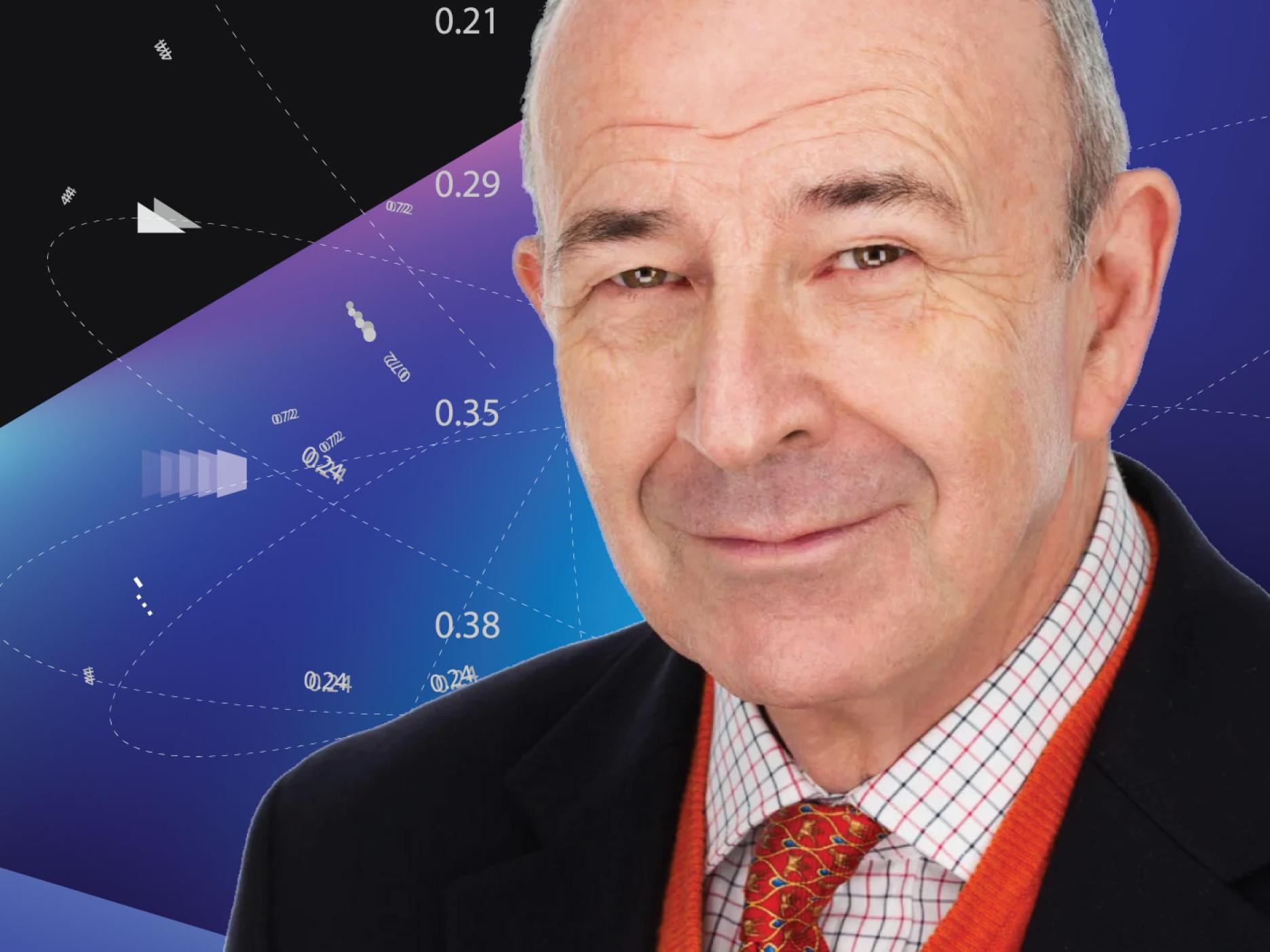
Lecture Description / Abstract
The Random Neural Network (RNN) is a mathematical model that Erol invented to mimic the behaviour of biological neurons and imitate the required «learning» ability of a neural network, since it is a universial approximator for continuous and bounded functions. In neural network terminology, it is a «recurrent» model in the sense that it can—in general—incorporate feedback loops, and yet still has a well-defined unique solution despite its non-linear computational structure. In essence, the RNN is a continuous time and discrete state-space multi-dimensional Markov chain whose states are the n-vectors {k}, of natural numbers, where each natural number represents the instantaneous «excitation level» or «discrete internal voltage» of each of the n neurons.
Erol will define the RNN model and derive its Chapman-Kolmogorov (differential-difference) equations that characterize the underlying Markov chain. He will show that under stability conditions, it has a unique stationary solution that is calculated from an «exact non-linear mean-field equation». Furthermore, similar to certain queueing networks (Jackson, BCMP) which have linear mean-field equations, the RNN has a Product Form Solution, and its stationary probability distribution is the product of the marginal probability distributions associated to each individual neuron. This analytical structure leads to an O(n^3) gradient-based deep learning algorithm, and to the use of other optimization techniques such as FISTA.
Based on these results, Erol will illustrate the use of the RNN for diverse applications, such as a patented tumor detection algorithm for Magnetic Resonance Images, color texture learning and generation, patented reinforcement learning for packet network routing, and the detection of Botnets and other cyberattacks.
About Erol S. Gelenbe
Erol S. Gelenbe (TANDON ’68, ’70) FIEEE FACM FIFIP, graduated from METU (Turkey), received his PhD from the NYU Tandon School of Engineering, and his Doctor of Mathematical Sciences from the Sorbonne. His career has included a tenure track position at the University of Michigan, a research directorship at INRIA, and professorships at the Universities of Liège (Belgium), Paris-Saclay, INRIA, Ecole Polytechnique, Duke University, University of Central Florida, and Imperial College, serving as a faculty member or Department Head. His diverse honors and awards include the Parlar Foundation Science Award (1994), Turkey, the Grand Prix France Télécom (1996), the UK Oliver Lodge Medal for Innovation, Imperial College Rector’s Research Award, the ACM SIGMETRICS Life-Time Achievement Award, the Mustafa Prize (2017), and Honorary Degrees from University of Roma II, Bogaziçi University (Istanbul), and the University of Liège.
Erol was elected to Academia Europaea, the French National Academy of Technologies, the Science Academies of Hungary, Poland, and Turkey, the Royal Academy of Sciences, Arts and Letters of Belgium, the Science Academy of the Organization of Islamic States, and to Foreign Fellowship of the Indian National Science Academy in 2025. He was awarded the Chevalier de la Légion d’Honneur and Commandeur de l’Ordre national du Mérite by the President of France, Commendatore al Merito della Repubblica and Grande Ufficiale della Stella d’Italia by the President of Italy, Commandeur de l’Ordre de la Couronne by the King of Belgium, and the Cross of Officer of Merit by the President of Poland.
Erol has graduated over 90 PhD students, including 25 women. Four of his former PhD students, including two women, were elected to the national academies of Canada and France. His recent election statement to the Indian National Science Academy states that he is a «pioneering researcher in Computer Systems and Networks. Using Markovian and semi-Markov methods, he obtained several seminal analytical results regarding the page fault rates in large classes of memory management algorithms, derived the stability and optimal control of the ALOHA communication system, and the load-dependent optimal values of checkpoints for databases. He invented new modeling and analysis methods, including the G-Network model. He invented the spiking random neural network and its deep learning, auto-associative, and reinforcement algorithms. His technological contributions include a patented optimal architecture for many-to-many communications, patented reinforcement learning routing for edge networks and the Internet, and the industrial simulation tool Flexsim.»
Jennifer Sinclair Curtis
Distinguished Professor of Chemical Engineering and Dean of Engineering at University of California, Davis
"Flow Behavior of Cohesive and Aspherical Particles in Hoppers and Shear Cells"
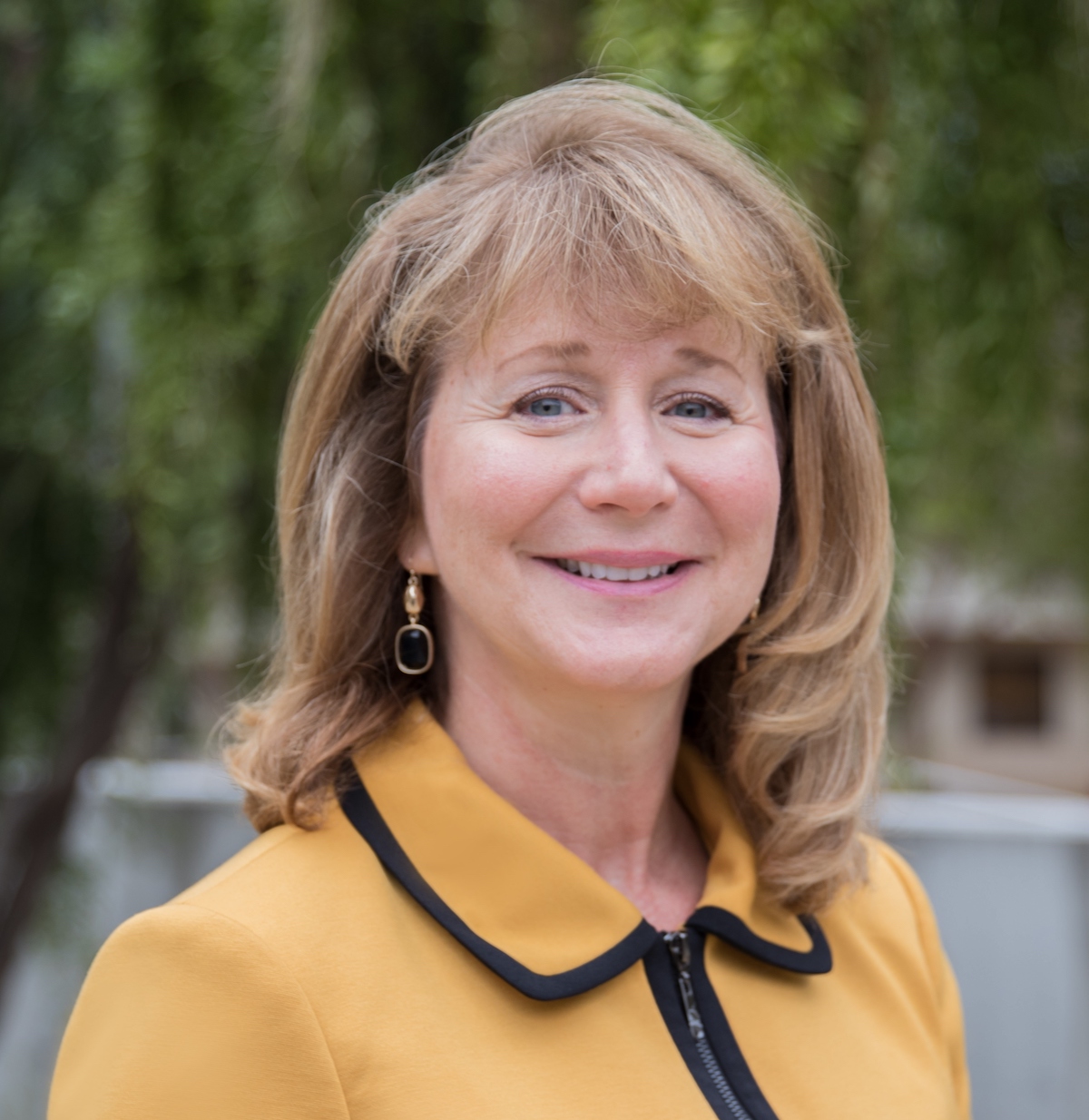
April 3, 2020
CANCELED
About Jennifer Sinclair Curtis
Jennifer Sinclair Curtis is Distinguished Professor of Chemical Engineering and Dean of Engineering at University of California, Davis. Her research focuses on the development and validation of particle flow models which have been extensively adopted by both commercial and open source CFD software packages. She was the first to partner with ANSYS Fluent to greatly expand the multi-phase simulation capability of the code which is used by 96 of the 100 biggest industrial companies in the world and over 40,000 customers. Her particulate flow models are also included in the CFD Research Corporation software package and the open-source CFD codes OpenFOAM and MFIX. She is a Fellow of AAAS, ASEE and AIChE. She is recipient of AIChE’s Particle Technology Forum’s Lifetime Achievement Award, a Fulbright Senior Research Scholar Award, AIChE's Thomas-Baron Award in Fluid-Particle Systems, ASEE’s Chemical Engineering Lectureship Award, ASEE’s CACHE Award for Excellence in Computing in Chemical Engineering Education, ASEE's Sharon Keillor Award for Women in Engineering, and the NSF Presidential Young Investigator Award. She also received the Van Antwerpen Award — the highest award for service to the Institute by the AIChE Board of Directors. She received her PhD in Chemical Engineering from Princeton University and her BS in Chemical Engineering from Purdue University which recently recognized her as a distinguished engineering alumna. She currently serves as Co-Chair of the National Academies’ Board on Chemical Sciences and Technology.
Lecture Description
The discrete element method (DEM) is a powerful simulation tool that provides the details of the flow of individual particles and facilitates quick parametric studies, eliminating the need for expensive experimental testing. This presentation will outline advances in DEM to simulate the motion of cohesive and/or aspherical particles. Aspherical grains are described either as perfect cylinders or disks of varying aspect ratio or described using a linked and overlapping sphere approach. Using this linked approach, the flow of flexible aspherical particles can also be treated via a bonded particle model that incorporates normal and shear forces as well as bending and torsional moments. The bonded particle model also allows for breakage of aspherical particles during impact. Cohesion between particles is described as originating either from surface moisture, described by a liquid bridge force model in the case of pendular liquid bridges, or from van der Waals interactions, described by the adhesive JKR model. DEM simulations are validated via experiments of hopper flow/discharge and measurements of particle-phase stress in a ring shear cell.
Vijay Kumar
Nemirovsky Family Dean, Penn Engineering
"Swarms of Small, Flying Robots"
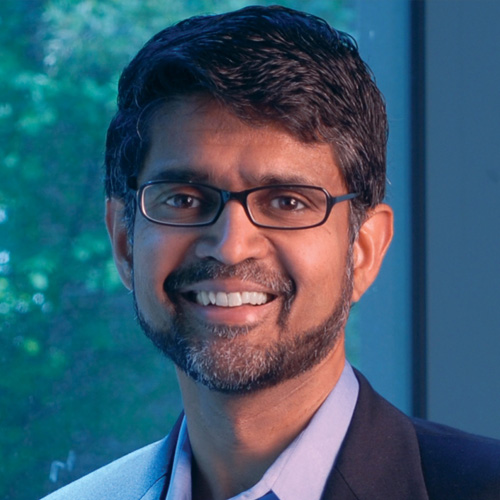
About Vijay Kumar
VIJAY KUMAR is the Nemirovsky Family Dean of Penn Engineering with appointments in the Departments of Mechanical Engineering and Applied Mechanics, Computer and Information Science, and Electrical and Systems Engineering at the University of Pennsylvania. He received his Bachelors of Technology from the Indian Institute of Technology, Kanpur and his Ph.D. from The Ohio State University in 1987. He has been on the Faculty in the Department of Mechanical Engineering at the University of Pennsylvania since1987.
Dr. Kumar served as the Deputy Dean for Research in the School of Engineering and Applied Science from 2000-2004. He directed the GRASP Laboratory, a multidisciplinary robotics and perception laboratory, from 1998-2004. He was the Chairman of the Department of Mechanical Engineering and Applied Mechanics from 2005-2008. He then served as the Deputy Dean for Education in the School of Engineering and Applied Science from 2008-2012. He has served as the assistant director of robotics and cyber physical systems at the White House Office of Science and Technology Policy (2012 – 2013).
Dr. Kumar is a Fellow of the American Society of Mechanical Engineers (ASME) and the Institute of Electrical and Electronic Engineers (IEEE). He has served on the editorial boards of the IEEE Transactions on Robotics and Automation, IEEE Transactions on Automation Science and Engineering, ASME Journal of Mechanical Design, the ASME Journal of Mechanisms and Robotics and the Springer Tract in Advanced Robotics (STAR). He is the recipient of the 1991 National Science Foundation Presidential Young Investigator award, the 1996 Lindback Award for Distinguished Teaching (University of Pennsylvania), the 1997 Freudenstein Award for significant accomplishments in mechanisms and robotics, the 2012 ASME Mechanisms and Robotics Award, the 2012 IEEE Robotics and Automation Society Distinguished Service Award, a 2012 World Technology Network (wtn.net) award, a 2013 Popular Mechanics Breakthrough Award, a 2014 Engelberger Robotics Award, the 2017 IEEE Robotics and Automation Society George Saridis Leadership Award, the 2017 ASME Robert E. Abbott Award, and the 2018 IEEE Robotics and Automation Pioneer Award. He has won best paper awards at DARS 2002, ICRA 2004, ICRA 2011, RSS 2011, RSS 2013, ICRA 2014, BICT 2015, and MARSS 2016 and has advised doctoral students who have won Best Student Paper Awards at ICRA 2008, RSS 2009, and DARS 2010. He was elected to the National Academy of Engineering in 2013 and the American Philosophical Society in 2018.
Lecture Description
The last decade has seen rapid advances in computation, sensing, and communication that has created new opportunities for flying robots. This talk will examine some of the relevant technological drivers and scientific advances, and explore challenges of realizing autonomous swarms of flying robots in environments with obstacles in the absence of GPS with opportunities for first response, and mining and construction.
Fotis Sotiropoulos
Dean, College of Engineering and Applied Sciences, Stony Brook University
"Tackling Complex Flow Problems via Numerical Simulation: From Jumping Fish and Heart Valves to River Flooding and Wind Energy"
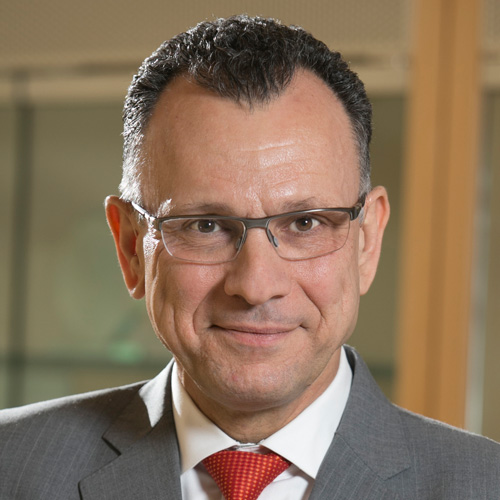
About Dean Sotiropoulos
Fotis Sotiropoulos serves as Dean of the College of Engineering and Applied Sciences and SUNY Distinguished Professor of Civil Engineering at Stony Brook University. Before joining Stony Brook, he was the James L. Record Professor of Civil Engineering; Director of the St. Anthony Falls Laboratory; and Director of the EOLOS wind energy research consortium at the University of Minnesota, Twin Cities (2006-2015). Prior to that, he was on the faculty of the School of Civil and Environmental Engineering at the Georgia Institute of Technology, with a joint appointment in the G. W. Woodruff School of Mechanical Engineering (1995-2005). His research focuses on simulation-based engineering science for tackling complex, societally relevant fluid mechanics problems in energy, environment and human-health applications. He has authored more than 190 peer-reviewed journal papers and book chapters and his research results have been featured on the cover of several prestigious journals. His laurels include the 2019 American Geophysical Union (AGU) Hydrology Days Borland Lecture in Hydraulics, the 2017 Hunter Rouse Hydraulic Engineering Award from the American Society of Civil Engineers (ASCE), a 2014 distinguished lecture of the Mortimer and Raymond Sackler Institute of Advanced Studies at Tel Aviv University, and a CAREER Award from the National Science Foundation. Sotiropoulos is a Fellow of the American Physical Society (APS) and the American Society of Mechanical Engineers (ASME) and has twice won the APS Division of Fluid Dynamics Gallery of Fluid Motion (2009, 2011).
Lecture Description
The fluid mechanics problems at the center of many of these challenges are often so complex that simulation-based research is the only viable approach for tackling them. Examples range from disease-promoting blood-flow patterns in the human heart and bio-inspired swimming robots to extreme flooding in waterways and harnessing renewable energy from wind, currents, and waves. Accurate numerical simulation of such flows poses a formidable challenge to even the most advanced computational methods available today. Dean Sotiropoulos will discuss the advances he has made in developing a powerful computational framework, the Virtual Flow Simulator (VFS), which can: handle arbitrarily complex geometries encountered in real-life applications; simulate fluid-structure interaction for rigid and flexible bodies; account for two-phase flows and free surface effects; and carry out coherent-structure-resolving simulations of turbulent flows in arbitrarily complex domains with dynamically evolving boundaries. The ability of the method to yield striking new insights into the physics of a broad range of real-life problems will be demonstrated by discussing applications in aquatic biology, cardiovascular engineering, turbulence and transport processes in natural waterways, and wind and marine and hydrokinetic energy. He will also touch upon future grand challenges and opportunities for simulation-based fluid mechanics research.
Richard N. Foster
Emeritus Senior Partner of McKinsey & Company
"History of the Concept of Creativity"
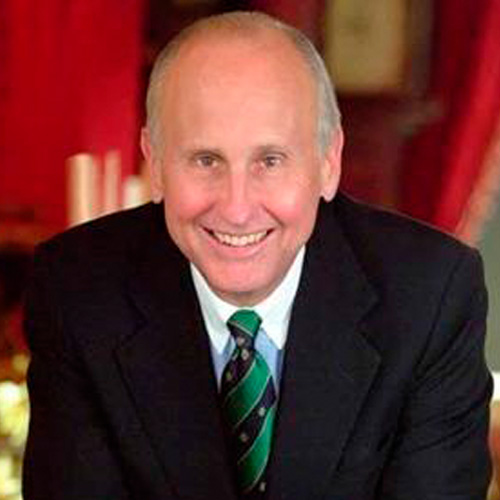
About Richard N. Foster
Dr. Foster currently serves as chairman of Ancera Diagnostics, lead director at ZocDoc, director at Advantia Health and LeanTaas, advisory member of Tsinghua University’s Research Center on Technological Innovation, and fellow at the venture incubator Creative Destruction Laboratory. He is the author of two best-selling books, Innovation: The Attacker’s Advantage and Creative Destruction, and he will be providing us with unique insights gleaned from more than three decades in the field.
Martin E. Hellman
Professor Emeritus of Electrical Engineering, Stanford University
"The Evolution of Public Key Cryptography"
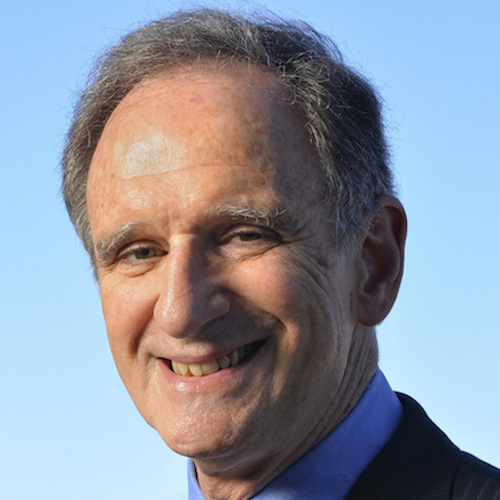
About Martin E. Hellman
Martin Hellman is best known for inventing public key cryptography, the technology that enables secure Internet transactions. He also has contributed to the computer privacy debate and was a key participant in the “first crypto war” of the late 1970s. He has authored over seventy technical papers, twelve US patents and a number of foreign equivalents. His many honors include election to the National Academy of Engineering and receiving (jointly with his colleague Whit Diffie) the million dollar ACM Turing Award, the top prize in computer science.
Lecture Description
While public key cryptography is seen as revolutionary, after this talk you might wonder why it took Whit Diffie, Ralph Merkle and Hellman so long to discover it. This talk also highlights the contributions of some unsung (or “under-sung”) heroes: Ralph Merkle, John Gill, Stephen Pohlig, Richard Schroeppel, Loren Kohnfelder, and researchers at GCHQ (Ellis, Cocks, and Williamson).
Kai-Fu Lee (李开复)
Chairman and CEO of Sinovation Ventures
"The Era of Artificial Intelligence"
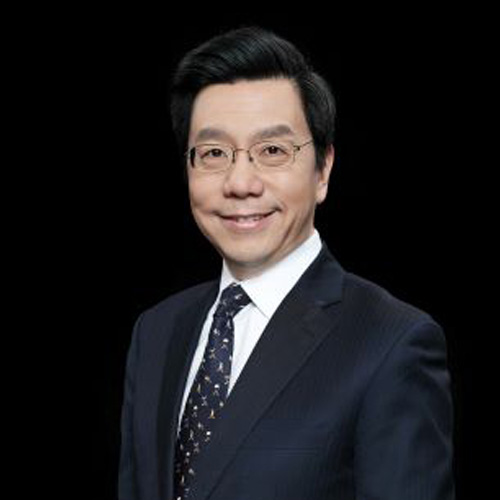
About Kai-Fu Lee (李开复)
Dr. Kai-Fu Lee is the Chairman and CEO of Sinovation Ventures (www.sinovationventures.com/) and President of Sinovation Venture’s Artificial Intelligence Institute. Sinovation Ventures, managing US$1.7 billion dual currency investment funds, is a leading venture capital firm focusing on developing the next generation of Chinese high-tech companies. Prior to founding Sinovation in 2009, Dr. Lee was the President of Google China. Previously, he held executive positions at Microsoft, SGI, and Apple. Dr. Lee received his Bachelor degree from Computer Science from Columbia University, Ph.D. from Carnegie Mellon University, as well as Honorary Doctorate Degrees from both Carnegie Mellon and the City University of Hong Kong. He was named one of the most influential 100 people in the world by Time in 2013. He is also a Fellow of the Institute of Electrical and Electronics Engineers (IEEE), and followed by over 50 million audience on social media.
In the field of artificial intelligence, Dr. Lee built one of the first game playing programs to defeat a world champion (1988, Othello), as well as the world’s first large-vocabulary, speaker-independent continuous speech recognition system. Dr. Lee founded Microsoft Research China, which was named as the hottest research lab by MIT Technology Review. Later renamed Microsoft Research Asia, this institute trained the great majority of AI leaders in China, including CTOs or AI heads at Baidu, Tencent, Alibaba, Lenovo, Huawei, and Haier. While with Apple, Dr. Lee led AI projects in speech and natural language, which have been featured on Good Morning America on ABC Television and the front page of Wall Street Journal. He has authored 10 U.S. patents, and more than 100 journal and conference papers. Altogether, Dr. Lee has been in artificial intelligence research, development, and investment for more than 30 years. His latest book AI Superpowers (aisuperpowers.com) releasing fall 2018 discusses US-China co-leadership in the age of AI as well as the greater societal impacts brought upon by the AI technology revolution.
Lecture Description
Kai-Fu Lee (李开复) talks about the four waves of Artificial Intelligence (AI) , and how AI will permeate every part of our lives in the next decade. He also talks about how this will be different from previous technology revolutions -- it will be faster and be driven by not one superpower, but two (US and China). AI will add $16 trillion to our global GDP, but also cause many challenges that will be hard to solve. He talks in particular about AI replacing routine jobs -- the consequences, the proposed solutions that don't work (such as UBI), and end with a blueprint of co-existence between humans and AI.

